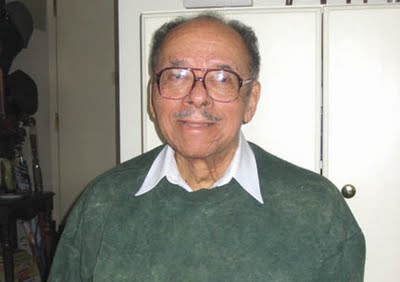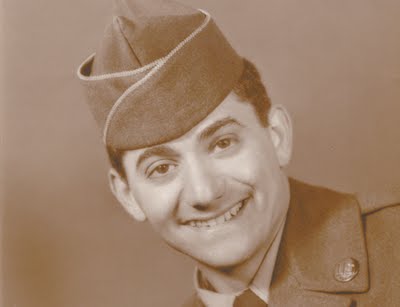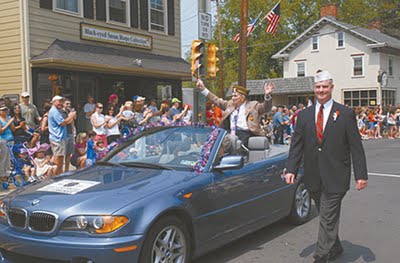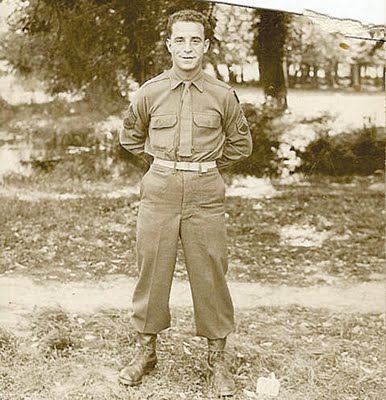Leon Bass
WWII combat engineer became a champion for peace and equality.
By R. Kurt Osenlund, BucksLocalNews.com

Leon Bass is a fine storyteller, and he has an incredible story to tell. The extremely eloquent 85-year-old, who lives in an apartment in Newtown’s Pennswood Village, has lived a life that would warrant a feature film. A WWII combat engineer who grew up before the Civil Rights Movement, he’s seen and endured hateful atrocities at home and abroad, only to emerge victorious as a resolute soldier for peace, equality and enlightenment.
Along with four brothers and one sister, Bass was raised by parents Henry and Nancy in a Philadelphia household. After graduating from West Philadelphia High School in 1943, Bass was voluntarily inducted into the Army and sent off to Camp Wheeler in Georgia for basic infantry training. He was placed in an all-black unit under the leadership of white officers.
“It was horrendous,” Bass says. “I had never experienced the kind of racism I experienced there. It was present in Philadelphia, but nowhere near as blatant. My father used to want to take me back to his hometown in South Carolina, but my mother always advised against it. I understood why when I got to the South. It was a very painful experience.”
Bass spent four months at Camp Wheeler before becoming a combat engineer and moving on to Camp McCain in Mississippi, a base that would send him out on long outdoor “maneuvers” to practice battle tactics. He then made his way to Camp Robinson in Arkansas to prepare for overseas duty, and soon found himself in Fordingbridge, a country town in Hampshire, England that would serve as a post to organize supplies. In December 1944, he crossed the English Channel into France and awaited orders in the bitter cold.
“When orders came down, we were told we were going to be part of the third army under the command of General George Patton,” Bass says.
Bass and the rest of the men in his unit were assigned the duty of repairing a bridge near the town of Martelange in Belgium. The bridge needed to be fixed so tanks, guns, men and ammunition could pass through and reach the adjacent town of Bastogne, where Americans were trapped by German soldiers.
“We worked night and day,” Bass says, “in spite of the weather, in spite of the land mines we would encounter, in spite of that one plane that seemed to fly over every day trying to bomb the bridge. And we finished it on time. And all of those resources reached the other side and we were able to defeat the enemy. And that was all part of what we now know as the Battle of the Bulge.”
Bass says he was very proud of the victory, but seeing the bodies of the men who died in the battle got him questioning what he was doing at war in the first place. Knowing full well he may also die in battle, he began wondering what he was fighting for, remembering all the times he was discriminated against in America: denied the privilege of drinking at a water fountain, unwelcome at a restaurant, forced to stand for 100 miles on a bus with vacant seats.
“I was angry at my country,” Bass says. “I felt used and abused. I’m going to protect all these people with my life, should that become necessary? Fight to preserve all the wonderful things I’m not good enough to enjoy? But the war went on, and I had to keep my anger down inside.”
Bass received new orders to report to Weimar in East Germany, and before long he saw something that would alter his life and outlook forever. A lieutenant drove him and a fellow soldier to Buchenwald, a concentration camp.
“I was to have the shock of my life,” Bass says.
At 19, Bass had never even heard of a concentration camp, and received the rudest awakening imaginable. Bass saw what he calls “the walking dead” – people who were skin and bone with skeletal faces. He says the stench of death and human waste was unbearable. He saw torture chambers, and human experimentation labs with body parts in jars of formaldehyde. He saw human skin stretched out on tables, crematoriums with human remains and stacks of corpses.
“And I knew it was all because the Nazis were saying these people weren’t good enough and therefore could be terminated,” Bass says. “Something changed. I came into the camp angry, but now I could see more clearly. I understood that human suffering was not relegated to just me – it can touch all of us. I had seen the face of evil, and the hate I saw in the South couldn’t even compare to the hate of the Nazis. I realized I had something to fight for – I had to help to destroy that evil. I decided that if I made it home, I would do something to effectuate change.”
Less than a year later, in January of 1946, Bass made it home, and he got busy. Using the financial benefits from his military service, he got into West Chester University, where he still had to face down racism, unable to stay in the dormitories or eat in the cafeteria. Only the second member of his family to attend college, he focused on his education, and began to adopt a non-violent protest mentality. After graduation he got a teaching job at an all-black elementary school in Philadelphia, and saw such landmark developments as the rise (and tragic fall) of Martin Luther King, Jr., the bold actions of Rosa Parks and the start of the Civil Rights Movement.
Bass became an elementary school principal in South Philadelphia, then the principal of an all-white school in the Northeast. Finally, he was called upon to be the principal of Benjamin Franklin High School, “the toughest school in the city” that, at the time, was all-male.
Bass has a knack for cleverly and dramatically unfurling the details as he recounts his life. There’s the sense he’s not only told this story before, but perfected the way he tells it. And then he explains how an Auschwitz survivor visited Benjamin Franklin High School one day, and wasn’t well-received by the unruly students until Bass told them to pipe down and listen, that he had seen the same things she did. After her presentation the survivor pulled Bass aside and told him he had a story to tell, too, and he needed to speak out.
“That was 1971,” Bass says, “and I’ve been speaking ever since. I’ve spoken at colleges, universities, maximum security prisons, churches, places across the country, overseas in Ireland, Bermuda. I was just at Plymouth Whitemarsh High School and soon I’ll be at a high school in Chicago. Because that evil is still with us. People are still doing evil things to each other. It will take over our hearts and minds if we let it, but we must not let that happen.”
By R. Kurt Osenlund, BucksLocalNews.com

Leon Bass is a fine storyteller, and he has an incredible story to tell. The extremely eloquent 85-year-old, who lives in an apartment in Newtown’s Pennswood Village, has lived a life that would warrant a feature film. A WWII combat engineer who grew up before the Civil Rights Movement, he’s seen and endured hateful atrocities at home and abroad, only to emerge victorious as a resolute soldier for peace, equality and enlightenment.
Along with four brothers and one sister, Bass was raised by parents Henry and Nancy in a Philadelphia household. After graduating from West Philadelphia High School in 1943, Bass was voluntarily inducted into the Army and sent off to Camp Wheeler in Georgia for basic infantry training. He was placed in an all-black unit under the leadership of white officers.
“It was horrendous,” Bass says. “I had never experienced the kind of racism I experienced there. It was present in Philadelphia, but nowhere near as blatant. My father used to want to take me back to his hometown in South Carolina, but my mother always advised against it. I understood why when I got to the South. It was a very painful experience.”
Bass spent four months at Camp Wheeler before becoming a combat engineer and moving on to Camp McCain in Mississippi, a base that would send him out on long outdoor “maneuvers” to practice battle tactics. He then made his way to Camp Robinson in Arkansas to prepare for overseas duty, and soon found himself in Fordingbridge, a country town in Hampshire, England that would serve as a post to organize supplies. In December 1944, he crossed the English Channel into France and awaited orders in the bitter cold.
“When orders came down, we were told we were going to be part of the third army under the command of General George Patton,” Bass says.
Bass and the rest of the men in his unit were assigned the duty of repairing a bridge near the town of Martelange in Belgium. The bridge needed to be fixed so tanks, guns, men and ammunition could pass through and reach the adjacent town of Bastogne, where Americans were trapped by German soldiers.
“We worked night and day,” Bass says, “in spite of the weather, in spite of the land mines we would encounter, in spite of that one plane that seemed to fly over every day trying to bomb the bridge. And we finished it on time. And all of those resources reached the other side and we were able to defeat the enemy. And that was all part of what we now know as the Battle of the Bulge.”
Bass says he was very proud of the victory, but seeing the bodies of the men who died in the battle got him questioning what he was doing at war in the first place. Knowing full well he may also die in battle, he began wondering what he was fighting for, remembering all the times he was discriminated against in America: denied the privilege of drinking at a water fountain, unwelcome at a restaurant, forced to stand for 100 miles on a bus with vacant seats.
“I was angry at my country,” Bass says. “I felt used and abused. I’m going to protect all these people with my life, should that become necessary? Fight to preserve all the wonderful things I’m not good enough to enjoy? But the war went on, and I had to keep my anger down inside.”
Bass received new orders to report to Weimar in East Germany, and before long he saw something that would alter his life and outlook forever. A lieutenant drove him and a fellow soldier to Buchenwald, a concentration camp.
“I was to have the shock of my life,” Bass says.
At 19, Bass had never even heard of a concentration camp, and received the rudest awakening imaginable. Bass saw what he calls “the walking dead” – people who were skin and bone with skeletal faces. He says the stench of death and human waste was unbearable. He saw torture chambers, and human experimentation labs with body parts in jars of formaldehyde. He saw human skin stretched out on tables, crematoriums with human remains and stacks of corpses.
“And I knew it was all because the Nazis were saying these people weren’t good enough and therefore could be terminated,” Bass says. “Something changed. I came into the camp angry, but now I could see more clearly. I understood that human suffering was not relegated to just me – it can touch all of us. I had seen the face of evil, and the hate I saw in the South couldn’t even compare to the hate of the Nazis. I realized I had something to fight for – I had to help to destroy that evil. I decided that if I made it home, I would do something to effectuate change.”
Less than a year later, in January of 1946, Bass made it home, and he got busy. Using the financial benefits from his military service, he got into West Chester University, where he still had to face down racism, unable to stay in the dormitories or eat in the cafeteria. Only the second member of his family to attend college, he focused on his education, and began to adopt a non-violent protest mentality. After graduation he got a teaching job at an all-black elementary school in Philadelphia, and saw such landmark developments as the rise (and tragic fall) of Martin Luther King, Jr., the bold actions of Rosa Parks and the start of the Civil Rights Movement.
Bass became an elementary school principal in South Philadelphia, then the principal of an all-white school in the Northeast. Finally, he was called upon to be the principal of Benjamin Franklin High School, “the toughest school in the city” that, at the time, was all-male.
Bass has a knack for cleverly and dramatically unfurling the details as he recounts his life. There’s the sense he’s not only told this story before, but perfected the way he tells it. And then he explains how an Auschwitz survivor visited Benjamin Franklin High School one day, and wasn’t well-received by the unruly students until Bass told them to pipe down and listen, that he had seen the same things she did. After her presentation the survivor pulled Bass aside and told him he had a story to tell, too, and he needed to speak out.
“That was 1971,” Bass says, “and I’ve been speaking ever since. I’ve spoken at colleges, universities, maximum security prisons, churches, places across the country, overseas in Ireland, Bermuda. I was just at Plymouth Whitemarsh High School and soon I’ll be at a high school in Chicago. Because that evil is still with us. People are still doing evil things to each other. It will take over our hearts and minds if we let it, but we must not let that happen.”
 RSS Feeds
RSS Feeds






